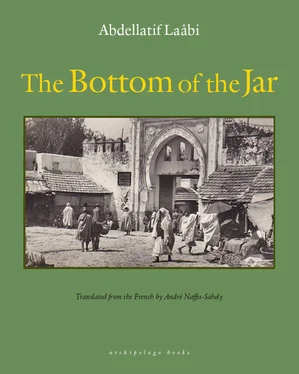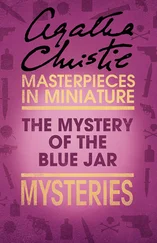We’re going to the stadium
Oh champions of ours
Pass us the ball
Don’t forget about us. .
Alongside everyone else, Namouss was shouting himself hoarse, filled with a sense of self-importance thanks to having made a common cause with them. He had no idea of the long walk that lay in store for him. Once they’d reached Bab Boujeloud, they would hit Bab Jdid, walk through the mellah, and still have a good deal of ground to cover before getting to the stadium. It didn’t cross anyone’s mind to take the bus or rent a horse-drawn carriage to save time. The walk to the stadium needed to be enthusiastic so as to send a message to all nearby inhabitants who might have been either indifferent or undecided. On reaching the gates of the municipal stadium, the crowd suddenly lost all discipline. It was every man for himself as people scrambled to buy tickets. There was nothing resembling a queue. People tried to slip around, above, and below one another. Elbows were employed, hips were used to create room, even the occasional punch when necessary. In that scramble for tickets, the strongest emerged victorious. As for the weaklings, the fainthearted, and those made effeminate by having been raised with good manners, they were left with no option but to deal with the scalpers, where they paid dearly for their ineptitude. It was a different story for children, who were divided into two categories. Those accompanied by their fathers or an older brother didn’t face any problems. Their entry was free as long as they were under ten. But this would give rise to issues with the ticket inspectors, who occasionally would turn a blind eye in exchange for a favor. As for those kids who weren’t accompanied, the feeling of suspense would last until the gates were finally shut. This would involve finding an adult on his own and then imploring him to take them by the hand so they could go in. It was the luck of the draw; one could chance upon a kind soul or a heart of stone. There was no way of knowing how it would turn out. The ones who got left behind were legion. They made do by following the match from afar, trying their best to interpret the booing, the cheering, the clapping, and the outbursts of music. Only when the second half of the game was well under way would the ticket inspector take pity on them and fling open the gates, allowing them to gather the crumbs of a mass that was nearing its end.
That day, fortunately, the ticket inspector was more than compassionate. The religious-nationalistic streak in him must have led him to a simple conclusion: The more Muslims there were to encourage the home team, the better. Namouss was admitted into the temple of temples without encountering any opposition: not into the grandstands, of course, but in the standing-only area, and not in the middle but at the very back, next to the woods. That’s where he followed the match from, looking through the wire fence surrounding the field, under the burning sun.
Following the referees, the players began to come out of the locker rooms. First came the Roches Noires players, who were greeted with timid catcalls. The players, however, did strike a fine appearance in their black-and-white-checked uniforms. They dispersed on one side of the field and started doing warm-ups. Their athletic build, suppleness, and imposing bulk were plain for all to see, inspiring an apprehensiveness that the spectators did their best to dispel. A sense of relief started to kick in once the first MAS players entered the field. Emotions were running high. It was a fateful moment. Had Couscous made the cut or not? Phew, there he was. He was greeted by thunderous applause followed by an uproar of bendirs and horns. The green-and-reds were all accounted for. MAS took possession of the remaining half of the field and gave a few acrobatic displays with their passing and dribbling, making the spectators even more enthusiastic. Zemmouri, who specialized in this sort of thing, and Cortès, who was renowned for his headers, took center field. Farina and Jamaï were puffing their chests and hot-footing it back and forth while hugging the sidelines. El-Manjra, the goalkeeper, who was idolized above everyone else, followed the display and scrupulously slipped on his gloves.
Only a few minutes after kickoff, something astonishing happened. An eerie silence descended over the grandstands and the standing-only area. The opposing team had gained the upper hand. What was more, the fact that the referee was both nit-picking and a Nazarene didn’t help things. He kept calling one penalty after the other, especially those committed by Couscous. The relentless persecution of a player who had just recovered from an injury provoked widespread anger. The catastrophe continued to unfold until Roches Noires succeeded in scoring a goal just before the end of the first half, despite a brilliant dive by El-Manjra. The crowd went into mourning. The musicians piped down. The halftime break saw analyses and counter-analyses made. The united front began to fall apart. Some stuck to their guns and fiercely defended their team and argued that the referee was biased and blamed the goal they’d suffered on bad luck. Others went over to the opposition and hurled torrents of grievous abuse. They were saying some pretty nasty things. Once the subject of adulation, Couscous was now considered the son of a slave — as if they’d just noticed that he was black. Thanks to having supposedly let the ball slip right between his legs, El-Manjra was called a pansy and a failure. While Cortès, the header virtuoso, was caricatured by the cartoonist as having a rotten melon instead of a head. Someone even ventured that the match had been fixed and that the MAS management had sold out to the enemy. The atmosphere was getting heated. Fights broke out. Mokhaznis armed with cudgels intervened to restore order. It was a bad day for people selling peanuts, chips, and fried sweets. They were forced to shout their heads off, and very few of their usual customers had the stomach for that sort of thing.
When the second half began, it was the home team’s turn to be greeted with boos and hisses, which were quickly drowned out by the applause of the loyalists, who were still in the majority. The second half started off with a surprise attack by MAS, allowing the public to see its team recover its proverbial punch. There was hope still, but time was quickly running out, and the Roches Noires defense seemed as impenetrable as a concrete wall. Then, during the last fifteen minutes, a MAS player was fouled right in the penalty area.
“ Pinanti! Pinanti !” the crowd screamed.
The referee seemed to hesitate, but faced with the public outcry, he granted MAS the penalty kick. Couscous dashed up from the back of the field to transform it. And he scored.
So the match ended in a draw, the worst kind of outcome for the majority of the spectators, who saw no sense in a contest unless there were clear winners and losers. That was the law. The walk downhill back to the Medina was gloomy, and the post-match analysis that took place the following day in the fine-leather workshop was filled with dismay. Sticking to his guns, the leatherworker tried to reassure his audience with another dictum that ought to be etched in marble: “Up until the final match, a championship can be won or lost.”
Having been an honorary witness to the crazy events on that day and its mixed results, Namouss didn’t know what to make of it all. His knowledge of soccer was patchy. He still didn’t know the offside rule, for example. Why is a player, who manages to slip past the opposing team’s defense and take up the best position to score, sanctioned? These tricks were very much allowed during the matches they played in the Bab Guissa cemetery, so much the worse for anyone who got caught out by these wily tactics. Beyond these technical considerations, it was all too clear that Namouss’s interest in soccer remained lukewarm at best. Ever since the Small Springs incident, large crowds made him nervous. Especially when they shouted, shoved, and got all riled up for reasons that more or less eluded him. Sometimes, when he began to feel faint, he had the odd temptation to let himself be overrun and carried away by a black cloud right up to the point of losing all consciousness. What instinct, fascination, or denial was at play here? He was at a loss, and had yet to find his way within the dark forest of questions.
Читать дальше












